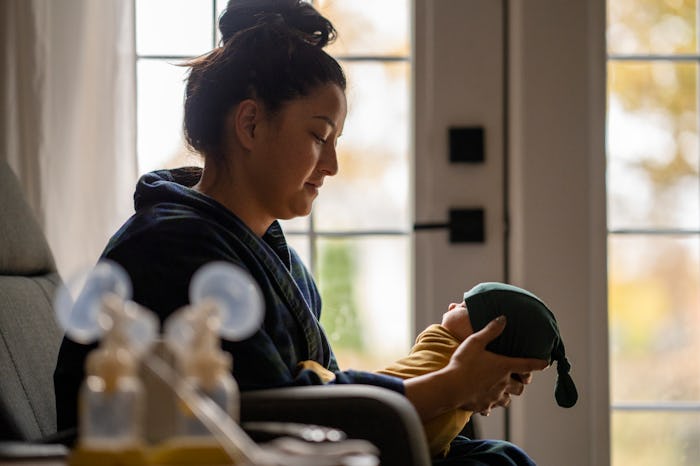Postpartum

Everything You Need To Know About Postpartum Carpal Tunnel
You can thank all of that swelling for the pain.
After having a baby, you expect to come out with some aches and pains as your body recovers from pregnancy and delivery, but the last thing you might expect is tingling pain in your hand. Postpartum carpal tunnel is something a lot of new moms deal with, and it can be extremely painful (which isn’t exactly ideal when you need your hands to care for a newborn baby). Thankfully, it’s a condition that will most likely go away on its own, but that doesn’t make living with it in the interim any more enjoyable.
What Is Postpartum Carpal Tunnel & How Long Does It Last?
In an interview with Romper, Jonathan D. Jaqua, DO, an OB/GYN practicing in Minnesota, explains that when someone has carpal tunnel they will experience a feeling of numbness or tingling in the three middle fingers of their hand (pointer, middle, and ring fingers). This pain can stay localized to this area or it can stretch from the base of the wrist to the tips of the fingers. Someone can experience carpal tunnel at any point, whether they’re pregnant or in the postpartum stage, but if it’s postpartum related, it’s typically the result of swelling. “[Carpal tunnel] is caused by pressure on the median nerve, which runs through your wrist at the base of your hand,” says Jaqua, “If it’s pregnancy or postpartum-related, it’s due to edema or swelling of the nerve or the tissue around [the nerve].”
The swelling that causes postpartum carpal tunnel is the same lingering swelling you often experience during pregnancy (in fact, you can experience symptoms of carpal tunnel during pregnancy, too). ObGyN Nisha Verma, MD, tells Romper, “The thought is that [postpartum carpal tunnel is] caused by pregnancy-related fluid retention... and there’s some thought that it might also be related to some hormonal changes during pregnancy that affects the musculoskeletal system.”
If you start to experience carpal tunnel during pregnancy, you may be looking at a few months with the condition, depending on when the pain starts. However, if you only started noticing symptoms of carpal tunnel postpartum, chances are high it will pass relatively quickly. “If it’s happening postpartum it’s just going to last as long as it takes to revascularize all of the fluid from pregnancy,” says Jaqua, “Usually that’s going to be anywhere from one to four weeks.”
How Do You Treat Postpartum Carpal Tunnel?
Assuming the carpal tunnel is, in fact, caused by postpartum swelling (and isn’t actual carpal tunnel syndrome, which often requires more intervention), treatment is fairly straightforward. “Often we recommend for people experiencing these symptoms a splint on their wrist,” says Verma, “[this] keeps the wrist in a neutral position or a slightly extended position and that can help with the symptoms of the numbness and tingling.” Typically, providers will recommend patients wear a splint only at night, but if the patient isn’t getting relief from this they will suggest wearing the split during the day, too.
“Regular things like ice, rest, ibuprofen, and Tylenol can be helpful” in treating pain from postpartum carpal tunnel, Jaqua notes. If these basic treatments don’t work, other options include stretches and, in more chronic scenarios, physical therapy. Additionally, Verma mentions that it can sometimes be treated with steroids, but this is something most providers try to stay away from during pregnancy and the postpartum period.
When Should You Call A Doctor About Postpartum Carpal Tunnel?
Both Jaqua and Verma agree that if you’re experiencing any kind of pain, numbness, or tingling it’s important to tell your provider. “It’s always good just to talk about it with your provider because even though we might think it’s happening because of pregnancy or postpartum, it could actually be carpal tunnel syndrome,” Jaqua explains, “so I always tell my patients it’s good to talk about it at any time so we can get them into physical therapy right away.” If you’ve already brought it up to your provider and it’s already being monitored, but the pain increases, then Verma notes this is also a good time to call your doctor. “At any point if it’s debilitatingly painful, if it’s getting progressively worse, or if they’re not seeing progressive improvement postpartum, then I would definitely recommend reaching out to a provider to do an exam,” says Verma.
As uncomfortable as postpartum carpal tunnel is, there is some comfort in knowing that it most likely won’t last beyond a few weeks. In the meantime, all you can do is consult with your doctor to see what kind of relief you can get, and try to rest your hands as much as possible (of course, that’s much easier said than done with a newborn to care for).
Experts:
Jonathan D. Jaqua, DO, ObGyn at Southdale ObGyn in Edina, MN
Nisha Verma, MD, ObGyn and abortion care provider and a Darney-Landy Fellow in the American College of Obstetricians and Gynecologists’ Strategies for Health Equity Department